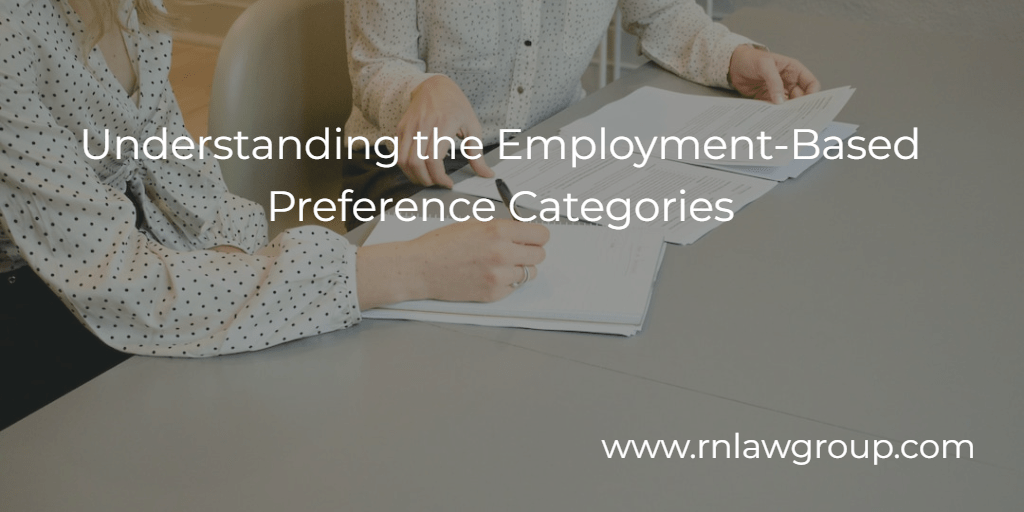
Understanding the Employment-Based Preference Categories
There is a limit on the number of immigrant visas that can be issued each year. These visas are distributed across five preference categories, each with its own set of eligibility requirements. The following are the preference categories:
- EB-1: Priority Workers
- EB-2: Professionals with Advanced Degrees and Individuals with Exceptional Ability
- EB-3: Skilled Workers, Professionals, and Other Workers
- EB-4: Special Immigrants
- EB-5: Immigrant Investors
Let’s examine each of these categories in greater depth.
EB-1: Priority Workers
Individuals with extraordinary abilities, outstanding professors or researchers, and multinational executives or managers fall under the EB-1 category. To qualify for the EB-1 category, individuals must meet specific criteria.
- Extraordinary Ability: Individuals must show extraordinary ability in the sciences, arts, education, business, or athletics through sustained national or international acclaim, evidenced by achievements like major awards, significant contributions, and recognition by experts. The criteria for demonstrating extraordinary ability can be found here.
- Outstanding Professors or Researchers: This category is for individuals who have a minimum of three years of experience in teaching or research and can demonstrate international recognition in their academic field. The criteria for demonstrating that an individual is an outstanding professor or researcher includes evidence of major awards, membership in associations that require members to demonstrate outstanding achievement, published material in professional publications written by others, participation as a judge of the work of others, original scientific or scholarly research contributions, and authorship of scholarly books or articles.
- Multinational Executives or Managers: To be eligible, the individual must have been employed abroad for at least one of the three years preceding the petition. The petitioning employer must be a U.S. employer, must have been in operation in the U.S. for at least 1 year, must have a qualifying relationship to the entity the individual worked for abroad, and must hire the individual on as an executive or manager.
EB-2: Professionals with Advanced Degrees and Individuals with Exceptional Ability
The EB-2 category is designed for individuals with advanced degrees and individuals with exceptional abilities. It includes two subcategories:
- Professionals with Advanced Degrees: Individuals must possess an advanced degree or its equivalent (a Bachelor’s degree plus 5 years of post-Bachelor’s, progressive work experience).
- Individuals with Exceptional Ability: This subcategory is open to individuals with exceptional ability in the sciences, arts, or business (meaning “a degree of expertise significantly above that ordinarily encountered in the sciences, arts, or business”). The criteria for demonstrating that an individual has exceptional ability can be found here.
EB-3: Skilled Workers, Professionals, and Other Workers
The EB-3 category covers a range of skilled, professional, and unskilled workers. It is divided into three subcategories:
- Skilled Workers: This subcategory is for individuals with at least two years of relevant work experience, education, or training.
- Professionals: Individuals in this subcategory must hold a Bachelor’s degree in a field related to their employment. A Bachelor’s degree must also be a normal requirement for entry into the occupation.
- Unskilled (Other Workers): This category is for individuals performing unskilled labor (requiring less than 2 years of training or experience) that is not of a temporary or seasonal nature.
EB-4: Special Immigrants
The EB-4 category is unique and caters to a diverse range of individuals. To qualify, individuals must meet specific criteria related to their unique circumstances and qualifications. The following individuals fall under the EB-4 category.
- Religious workers;
- Special Immigrant Juveniles;
- Certain broadcasters;
- Certain retired officers or employees of a G-4 international organization or NATO-6 civilian employees;
- Certain employees of the U.S. government who are abroad;
- Members of the U.S. armed forces;
- Panama Canal company or Canal Zone government employees;
- Certain physicians licensed and practicing medicine in a U.S. state as of Jan. 9, 1978; and,
- Noncitizens who have supplied information concerning a criminal organization or enterprise or a terrorist organization, enterprise, or operation (S nonimmigrants).
EB-5: Immigrant Investors
The EB-5 category is aimed at immigrant investors seeking to invest a significant amount of capital in a new commercial enterprise that creates jobs for U.S. workers. Specifically, this category is for immigrant investors who are investing $1,050,000 (or $800,000 in a targeted employment area or infrastructure project) in a new business that will boost the U.S. economy and create at least 10 full-time jobs for qualified workers. An in-depth discussion on the EB-5 category can be found here.
The employment-based preference categories play a crucial role in attracting talented individuals and professionals from around the world to contribute to the country’s economic growth and innovation. While navigating these categories can be complex, understanding the eligibility requirements is essential for those seeking to make the U.S. their permanent home. Whether you are an extraordinary talent in your field, a multinational executive, a skilled worker, or an immigrant investor, the employment-based preference categories offer a diverse array of opportunities to achieve the American dream.
Reddy Neumann Brown PC. is dedicated to helping our clients navigate the U.S. business immigration system. Because the U.S. business immigration system can be tricky, it is always best to contact a qualified immigration attorney to help come up with the proper solution for each individual case.
By: Camille Joson
Camille Joson is a Senior Associate Attorney in Reddy Neumann Brown PC’s PERM Labor Certification Department, where she assists clients in the beginning stages of the green card process.

